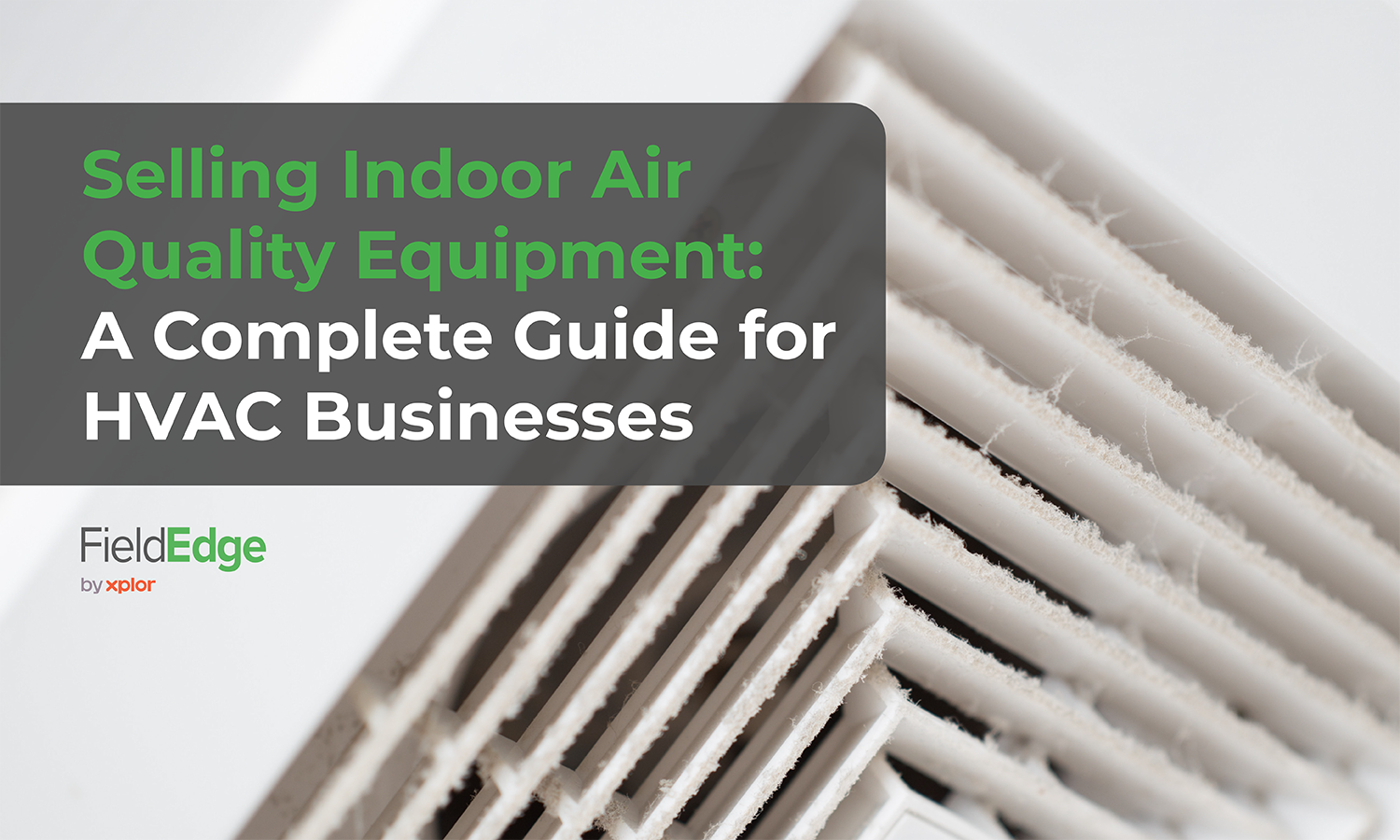Indoor air quality (IAQ) is increasingly becoming a top priority for homeowners and businesses alike. With growing awareness of pollutants, allergens and airborne viruses, offering Indoor air quality equipment (IAQ) as part of your HVAC services is not only a way to serve your clients better but also a great opportunity for increasing revenue.
In this blog, we will dive into how HVAC businesses can benefit from selling IAQ products and the strategies you can use to maximize your success in this lucrative market including:
- The growing demand for indoor air quality equipment
- Key types of IAQ equipment HVAC businesses can offer
- Effective selling strategies for IAQ solutions
- Educating your customers on the importance of air quality
- How to position IAQ products as an essential service
Why Focus on Selling Indoor Air Quality Equipment?
As the world becomes more health-conscious, HVAC companies are presented with an excellent opportunity to expand their offerings by selling indoor air quality equipment.
Now, more than ever, customers are aware of the negative effects that poor air quality can have on health and wellness. The need for cleaner, safer indoor environments is driving the demand for effective IAQ solutions and HVAC companies that capitalize on this trend can differentiate themselves in a competitive market.
Selling Indoor air quality equipment can help:
- Increase sales and revenue by offering high-margin products
- Enhance customer satisfaction with cleaner, healthier air
- Build trust and credibility as an expert in air quality solutions
Let’s take a look at the different types of equipment, how to sell them and how to communicate the benefits to your clients.
Understanding the Demand for Indoor Air Quality Equipment
According to the EPA, on average, Americans spend about 90% of their time indoors, where pollutant levels can be 2 to 5 times higher than outdoor concentrations.
That’s a big factor in the demand for better indoor air quality—making this one of the biggest selling points to hammer home to customers.
Understanding why people are seeking better air quality is crucial for selling the right products. Consumers are more aware of allergens, pollution and even the effects of COVID-19, leading to a stronger demand for air purification, filtration and ventilation solutions.
Key drivers of demand include:
- Health concerns: People with allergies, asthma, or respiratory issues often experience significant relief with improved air quality.
- COVID-19: The pandemic has increased the demand for better ventilation and filtration systems to reduce airborne virus transmission.
- Regulations: In some areas, there are growing regulations around the air quality standards that commercial buildings must meet, driving the demand for IAQ solutions.
Types of Indoor Air Quality Equipment to Offer
A successful IAQ sales strategy starts with offering the right mix of products that address a wide range of air quality issues. Let’s explore the different types of indoor air quality equipment that HVAC businesses can provide.
There are many types of IAQ solutions available, ranging from basic filters to advanced air purifiers. Understanding the various options will help you recommend the best solutions based on your clients’ needs.
- Air Purifiers: These systems are designed to remove contaminants like dust, pollen, mold and other airborne particles from indoor air. Many modern air purifiers come with HEPA filters, UV light, or ionization technology to capture and neutralize pollutants.
- Ventilation Systems: Proper ventilation is key to maintaining healthy indoor air quality. Mechanical ventilation systems, including energy recovery ventilators (ERVs) and heat recovery ventilators (HRVs), help bring fresh air into indoor spaces while expelling stale air.
- Humidifiers and Dehumidifiers: Keeping humidity levels within the ideal range is essential for preventing mold growth and respiratory issues. Depending on the local climate, your clients may benefit from whole-home humidifiers or dehumidifiers.
- Advanced Filtration Systems: MERV-rated filters, electronic air cleaners and activated carbon filters are essential for trapping particulates and neutralizing harmful gasses or odors in the air.
- UV Lights: Ultraviolet germicidal lights can be installed in HVAC systems to eliminate bacteria, viruses and mold that accumulate in the ducts, keeping air cleaner and healthier.
Educating Your Customers on the Importance of Air Quality
While some customers may already know about the importance of indoor air quality, others may need some guidance. Educating your clients on the dangers of poor air quality and how indoor air quality equipment can make a difference is a key part of your selling strategy.
Plus, education is a powerful tool for HVAC businesses looking to upsell IAQ equipment. By explaining the benefits of these products in a way that resonates with customers, you can create a demand that wasn’t previously there.
- Health Benefits: Explain how clean air can help reduce allergy symptoms, improve sleep quality and lower the risk of respiratory infections.
- Energy Efficiency: Many IAQ products, like ERVs, not only improve air quality but also enhance the energy efficiency of a building by balancing ventilation needs.
- Longevity of HVAC Systems: Good air quality can help extend the life of an HVAC system by reducing the amount of dust and debris that clogs filters and damages components.
Effective Selling Strategies for Indoor Air Quality Equipment
Whether you’re offering these products as an add-on or part of a larger HVAC service package, having a clear approach to upselling is key.
Selling IAQ equipment isn’t just about highlighting the features of the products but also showing how they improve your customers’ lives. Providing solutions to real concerns, rather than just products, can help you close more sales.
- Offer Free IAQ Assessments: Conduct a free air quality assessment as part of your service. Use tools like air quality monitors to show customers real-time data about their indoor air, which can build a case for why they need IAQ solutions.
- Bundle Products: Create packages that combine HVAC maintenance or repair services with IAQ products at a discount. This makes the purchase feel like a better value.
- Use Testimonials and Case Studies: Show potential buyers how your IAQ solutions have helped other customers by providing real-world success stories and reviews.
Leveraging Field Service Software to Manage IAQ Sales
Managing multiple IAQ product sales can get complicated, but with the right field service management (FSM) software, you can streamline the process. FSM software helps:
- Track Leads and Sales: Use your FSM software to monitor customer interest in IAQ products and follow up with personalized offers.
- Inventory Management: Keep an accurate record of IAQ equipment in stock and reorder when necessary, ensuring you’re always prepared for customer demand.
- Post-Installation Support: FSM tools can automate follow-up emails and maintenance reminders, ensuring customer satisfaction and potential repeat business.
See how FieldEdge can save you time and money. Book your FREE personalized demo today!
The Future of Indoor Air Quality Equipment in HVAC Sales
As customer awareness around air quality grows, the demand for Indoor air quality equipment will only increase. By integrating these products into your service offerings and educating customers on their benefits, you’ll position your HVAC business for greater success.
Here are a few key takeaways to remember going forward:
- Demand for indoor air quality equipment is rising due to health concerns and the desire for safer indoor environments.
- Offering a wide range of IAQ products, such as air purifiers and ventilation systems, helps meet diverse customer needs.
- Educating customers about the health and efficiency benefits of IAQ solutions is essential for boosting sales.
- Implementing smart selling strategies and using FSM software will streamline your IAQ sales efforts and improve customer satisfaction.
By focusing on IAQ solutions, you can help your customers breathe easier while growing your HVAC business.
Related: Upselling HVAC Services: Strategies to Boost Revenue




